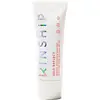What's inside
What's inside
 Key Ingredients
Key Ingredients

 Benefits
Benefits

 Concerns
Concerns

 Ingredients Side-by-side
Ingredients Side-by-side

Zinc Oxide
Cosmetic ColorantCaprylic/Capric Triglyceride
MaskingCoconut Alkanes
EmollientCetearyl Alcohol
EmollientGlycerin
HumectantAloe Barbadensis Leaf Juice
Skin ConditioningPyrus Malus Fruit Extract
Skin ConditioningCoco-Glucoside
CleansingLactobacillus Ferment
Skin ConditioningRubus Idaeus Seed Oil
EmollientCocos Nucifera Oil
MaskingCurcuma Longa Rhizome Oil
Skin ConditioningButyrospermum Parkii Nut Extract
EmollientHydrolyzed Jojoba Esters
Skin ConditioningTocopherol
AntioxidantDipotassium Glycyrrhizate
HumectantVanilla Planifolia Fruit Extract
Skin ConditioningGlycyrrhiza Glabra Root Extract
BleachingButylene Glycol
HumectantIsostearic Acid
CleansingLecithin
EmollientPolyglyceryl-3 Polyricinoleate
EmulsifyingPolyhydroxystearic Acid
EmulsifyingCoco-Caprylate/Caprate
EmollientCaprylyl/Capryl Glucoside
CleansingSclerotium Gum
Emulsion StabilisingCetearyl Glucoside
EmulsifyingEthylhexylglycerin
Skin ConditioningXanthan Gum
EmulsifyingOctyldodecanol
EmollientTapioca Starch
Citric Acid
BufferingSorbitan Oleate
EmulsifyingPhenoxyethanol
PreservativeSodium Benzoate
MaskingPotassium Sorbate
PreservativeZinc Oxide, Caprylic/Capric Triglyceride, Coconut Alkanes, Cetearyl Alcohol, Glycerin, Aloe Barbadensis Leaf Juice, Pyrus Malus Fruit Extract, Coco-Glucoside, Lactobacillus Ferment, Rubus Idaeus Seed Oil, Cocos Nucifera Oil, Curcuma Longa Rhizome Oil, Butyrospermum Parkii Nut Extract, Hydrolyzed Jojoba Esters, Tocopherol, Dipotassium Glycyrrhizate, Vanilla Planifolia Fruit Extract, Glycyrrhiza Glabra Root Extract, Butylene Glycol, Isostearic Acid, Lecithin, Polyglyceryl-3 Polyricinoleate, Polyhydroxystearic Acid, Coco-Caprylate/Caprate, Caprylyl/Capryl Glucoside, Sclerotium Gum, Cetearyl Glucoside, Ethylhexylglycerin, Xanthan Gum, Octyldodecanol, Tapioca Starch, Citric Acid, Sorbitan Oleate, Phenoxyethanol, Sodium Benzoate, Potassium Sorbate
Water
Skin ConditioningDimethicone
EmollientIsododecane
EmollientSd Alcohol 40-B
AstringentDipropylene Glycol
HumectantEthylhexyl Palmitate
EmollientPEG-10 Dimethicone
Skin ConditioningGlycerin
HumectantPolymethylsilsesquioxane
Vinyl Dimethicone/Methicone Silsesquioxane Crosspolymer
Polybutylene Glycol/PPG-9/1 Copolymer
Skin ConditioningDimethicone/Vinyl Dimethicone Crosspolymer
Skin ConditioningXylitol
HumectantMethyl Methacrylate Crosspolymer
Thiotaurine
AntioxidantScutellaria Baicalensis Root Extract
AstringentPaeonia Albiflora Root Extract
Skin ConditioningOnonis Spinosa Root Extract
AntiseborrhoeicEctoin
Skin ConditioningLauryl PEG-9 Polydimethylsiloxyethyl Dimethicone
Skin ConditioningHydrogen Dimethicone
Butylene Glycol
HumectantDisodium EDTA
Disteardimonium Hectorite
StabilisingAlumina
AbrasiveBHT
AntioxidantTriethoxycaprylylsilane
Syzygium Jambos Leaf Extract
Skin ConditioningTocopherol
AntioxidantPhenoxyethanol
PreservativeBenzoic Acid
MaskingParfum
MaskingTitanium Dioxide
Cosmetic ColorantMica
Cosmetic ColorantWater, Dimethicone, Isododecane, Sd Alcohol 40-B, Dipropylene Glycol, Ethylhexyl Palmitate, PEG-10 Dimethicone, Glycerin, Polymethylsilsesquioxane, Vinyl Dimethicone/Methicone Silsesquioxane Crosspolymer, Polybutylene Glycol/PPG-9/1 Copolymer, Dimethicone/Vinyl Dimethicone Crosspolymer, Xylitol, Methyl Methacrylate Crosspolymer, Thiotaurine, Scutellaria Baicalensis Root Extract, Paeonia Albiflora Root Extract, Ononis Spinosa Root Extract, Ectoin, Lauryl PEG-9 Polydimethylsiloxyethyl Dimethicone, Hydrogen Dimethicone, Butylene Glycol, Disodium EDTA, Disteardimonium Hectorite, Alumina, BHT, Triethoxycaprylylsilane, Syzygium Jambos Leaf Extract, Tocopherol, Phenoxyethanol, Benzoic Acid, Parfum, Titanium Dioxide, Mica
 Reviews
Reviews

Ingredients Explained
These ingredients are found in both products.
Ingredients higher up in an ingredient list are typically present in a larger amount.
Butylene Glycol (or BG) is used within cosmetic products for a few different reasons:
Overall, Butylene Glycol is a safe and well-rounded ingredient that works well with other ingredients.
Though this ingredient works well with most skin types, some people with sensitive skin may experience a reaction such as allergic rashes, closed comedones, or itchiness.
Learn more about Butylene GlycolGlycerin is already naturally found in your skin. It helps moisturize and protect your skin.
A study from 2016 found glycerin to be more effective as a humectant than AHAs and hyaluronic acid.
As a humectant, it helps the skin stay hydrated by pulling moisture to your skin. The low molecular weight of glycerin allows it to pull moisture into the deeper layers of your skin.
Hydrated skin improves your skin barrier; Your skin barrier helps protect against irritants and bacteria.
Glycerin has also been found to have antimicrobial and antiviral properties. Due to these properties, glycerin is often used in wound and burn treatments.
In cosmetics, glycerin is usually derived from plants such as soybean or palm. However, it can also be sourced from animals, such as tallow or animal fat.
This ingredient is organic, colorless, odorless, and non-toxic.
Glycerin is the name for this ingredient in American English. British English uses Glycerol/Glycerine.
Learn more about GlycerinPhenoxyethanol is a preservative that has germicide, antimicrobial, and aromatic properties. Studies show that phenoxyethanol can prevent microbial growth. By itself, it has a scent that is similar to that of a rose.
It's often used in formulations along with Caprylyl Glycol to preserve the shelf life of products.
Tocopherol (also known as Vitamin E) is a common antioxidant used to help protect the skin from free-radicals and strengthen the skin barrier. It's also fat soluble - this means our skin is great at absorbing it.
Vitamin E also helps keep your natural skin lipids healthy. Your lipid skin barrier naturally consists of lipids, ceramides, and fatty acids. Vitamin E offers extra protection for your skin’s lipid barrier, keeping your skin healthy and nourished.
Another benefit is a bit of UV protection. Vitamin E helps reduce the damage caused by UVB rays. (It should not replace your sunscreen). Combining it with Vitamin C can decrease sunburned cells and hyperpigmentation after UV exposure.
You might have noticed Vitamin E + C often paired together. This is because it is great at stabilizing Vitamin C. Using the two together helps increase the effectiveness of both ingredients.
There are often claims that Vitamin E can reduce/prevent scarring, but these claims haven't been confirmed by scientific research.
Learn more about Tocopherol